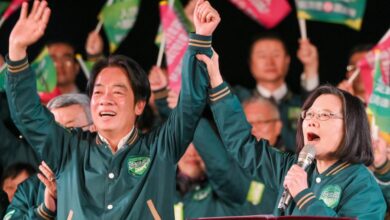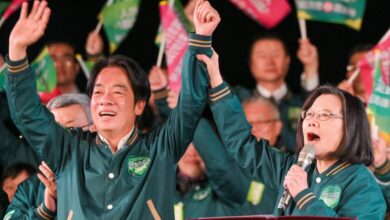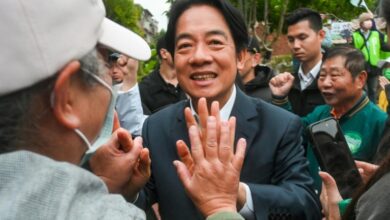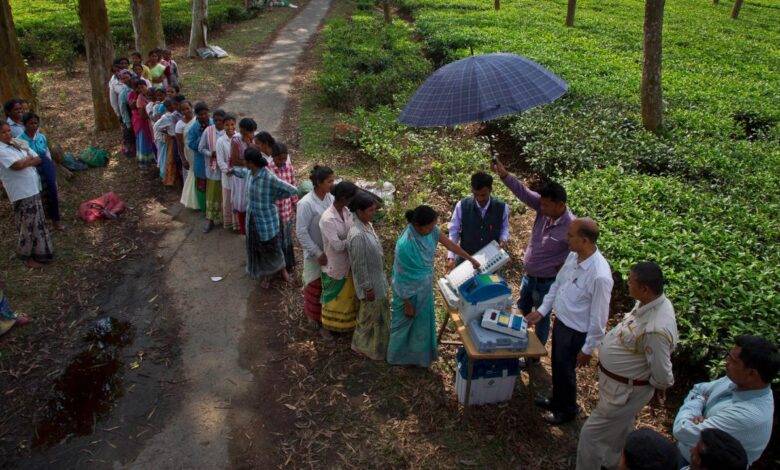
India Enters Election Year: A Nation at a Crossroads
India Enters Election Year: A Nation at a Crossroads. The air is thick with anticipation as India gears up for its general elections, a pivotal moment that will shape the nation’s future. The political landscape is a vibrant tapestry woven with diverse ideologies and ambitions, each vying for the support of the electorate.
This election is more than just a contest for power; it’s a referendum on India’s aspirations, its economic challenges, and its social fabric.
From the bustling metropolises to the rural heartland, the pulse of the nation quickens. Key issues such as economic growth, job creation, and social justice are at the forefront of the discourse. The electorate is keenly aware of the stakes involved, as their choices will determine the direction of the nation for the next five years.
This election promises to be a captivating spectacle, a testament to the vibrant democracy that India embodies.
Key Issues and Concerns
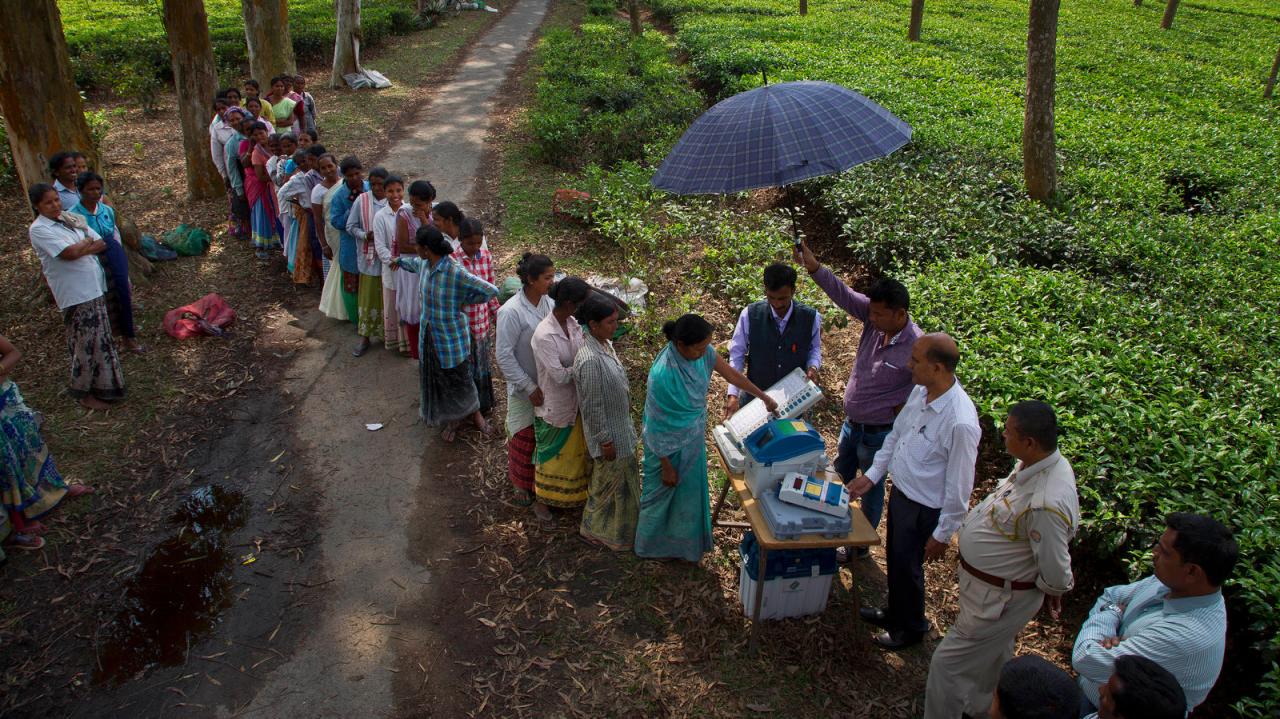
India’s upcoming election is expected to be one of the most closely watched and consequential in recent history. The nation is facing a multitude of challenges, both economic and social, that will undoubtedly shape the political landscape and influence voter choices.
Economic Challenges and their Impact on the Election
The Indian economy has been experiencing a period of sluggish growth, with concerns about unemployment, inflation, and income inequality. The government’s economic policies and their impact on the lives of ordinary citizens will be a major point of contention during the campaign.
- Unemployment: India’s unemployment rate has been consistently high, particularly among youth. The lack of job creation has become a significant concern for voters, who are seeking solutions to improve employment opportunities and economic prospects.
- Inflation: Rising prices of essential goods and services have eroded the purchasing power of consumers, particularly those in low-income households. The government’s ability to control inflation and ensure affordability will be a crucial factor in the election.
- Income Inequality: The gap between the rich and poor has widened in recent years, leading to concerns about social justice and economic fairness. The government’s efforts to address income inequality and promote inclusive growth will be closely scrutinized by voters.
Social Issues and their Influence on the Electorate
Social issues such as poverty, inequality, and religious tensions are deeply intertwined with the political landscape in India. These issues will likely play a significant role in shaping the electorate’s preferences and influencing their voting decisions.
- Poverty: Despite significant progress in reducing poverty, millions of Indians still live below the poverty line. The government’s policies aimed at alleviating poverty and improving the lives of the most vulnerable segments of society will be a major focus of the election campaign.
- Inequality: Social and economic inequality remains a persistent challenge in India. The government’s efforts to address these disparities, including promoting equal opportunities and access to resources, will be crucial in the election.
- Religious Tensions: Religious tensions and communalism have been on the rise in recent years, leading to concerns about social harmony and national unity. The government’s ability to maintain peace and foster religious tolerance will be a critical factor in the election.
Foreign Policy and National Security
India’s foreign policy and national security are increasingly intertwined with global events. The government’s stance on international issues, including its relationship with neighboring countries and its role in global organizations, will be closely watched by voters.
- Regional Security: India faces a complex security environment in its region, with ongoing tensions with neighboring countries. The government’s ability to maintain stability and ensure national security will be a key concern for voters.
- Global Engagement: India’s role in global affairs, including its participation in international organizations and its relationships with other countries, will be a significant aspect of the election campaign.
- National Security: The government’s policies on national security, including its approach to terrorism and its military preparedness, will be scrutinized by voters.
Electoral Process and Participation
India’s electoral system is a complex and multifaceted process, crucial to the functioning of its democratic republic. It involves a series of steps, from the nomination of candidates to the counting of votes, ensuring fair and transparent elections. This process has evolved over time, incorporating various reforms to address challenges and strengthen democratic principles.
India is entering a crucial election year, with political campaigns heating up across the country. While the nation focuses on its democratic process, the Indian football team faced a tough defeat in the Asian Cup, losing to Uzbekistan in a match that saw Australia advance to the last 16.
The match highlighted the challenges facing Indian football , a stark contrast to the energy and focus of the upcoming elections.
Voter Turnout and its Influencing Factors
Voter turnout is a critical indicator of the health of any democracy. In India, voter participation has been steadily increasing over the years, reflecting a growing awareness of the importance of exercising the right to vote. However, factors such as socioeconomic conditions, geographical location, and awareness campaigns play a significant role in shaping voter turnout.
India is gearing up for a crucial election year, with political parties already in full swing, strategizing and campaigning. While the world watches, it’s a reminder that even amidst global events, internal affairs take precedence. It’s not a surprise that Netanyahu has rejected the two-state solution , given the complexities of the Israeli-Palestinian conflict.
Back in India, the election year promises to be a whirlwind of debates, promises, and ultimately, the people’s decision.
- Socioeconomic Factors:Lower socioeconomic groups often face barriers to voting, including lack of awareness, limited access to information, and logistical challenges. For example, in rural areas, people may have to travel long distances to reach polling stations, impacting their ability to participate.
- Geographical Location:Turnout can vary across different regions of India, influenced by factors such as literacy rates, access to infrastructure, and political awareness. In areas with higher literacy rates and better infrastructure, voter turnout tends to be higher.
- Awareness Campaigns:Government initiatives and civil society organizations conduct awareness campaigns to encourage voter participation, especially among marginalized groups. These campaigns highlight the importance of voting and provide information about the electoral process.
Role of Media and Social Media in Shaping Public Opinion
The media plays a crucial role in shaping public opinion and influencing voters’ choices during elections. Traditional media, such as television and newspapers, along with the rise of social media platforms, have become powerful tools for disseminating information, promoting candidates, and shaping narratives.
India is entering a crucial election year, with the outcome likely to shape the country’s political landscape for years to come. As the campaigns heat up, it’s important to stay informed about the key issues and candidates. For a glimpse into the perspectives of international observers, check out this interview with Reed Brody, a renowned human rights advocate, en wb extrait itw reed brody , who offers insights on the challenges and opportunities facing India’s democracy.
Understanding the global context will be crucial in navigating the complex political dynamics unfolding in India during this election season.
- News Coverage and Bias:Media outlets often present biased coverage, favoring particular candidates or political parties. This can influence voters’ perceptions and create a distorted view of the political landscape.
- Social Media Influence:Social media platforms have become increasingly influential in shaping public opinion, enabling the spread of information, political discourse, and mobilization of voters. However, misinformation and fake news can also proliferate through these platforms, impacting voters’ decisions.
- Political Advertising:Candidates and political parties utilize media platforms for advertising campaigns, using various strategies to reach target audiences and promote their agendas. These campaigns often rely on emotional appeals and persuasive rhetoric to sway voters.
Potential Outcomes and Implications: India Enters Election Year
The upcoming Indian general election is a pivotal moment for the nation, with the potential to shape its trajectory for years to come. The outcome of the election will have significant implications for India’s domestic and foreign policies, its economic growth, and its social fabric.
Possible Outcomes and their Implications
The election could result in a decisive victory for one of the major political alliances, leading to a stable government with a clear mandate. Alternatively, a hung parliament, where no single party or coalition secures a majority, could emerge, leading to a period of political instability and uncertainty.
- A decisive victory for the ruling Bharatiya Janata Party (BJP) could lead to the continuation of its current policies, including economic liberalization, social reforms, and a strong focus on national security. This could also solidify the BJP’s position as the dominant political force in India, potentially leading to a more centralized political system.
- A victory for the opposition Indian National Congress (INC) or a coalition of opposition parties could result in a shift in policy direction, with a focus on social welfare, inclusive growth, and strengthening institutions. This could also lead to a more decentralized political system, with greater autonomy for state governments.
- A hung parliament could lead to a period of political instability and gridlock, with the government struggling to pass legislation and implement policies. This could also lead to increased political polarization and social unrest.
Impact on Regional Politics
The election outcome will have a significant impact on regional politics, with potential shifts in power dynamics and alliances.
- The election could see a rise in regional parties, particularly in states where they have been gaining popularity in recent years. This could lead to a more fragmented political landscape, with greater power vested in regional leaders.
- The outcome of the election could also influence the formation of new alliances and coalitions at the regional level, potentially leading to a reshuffling of political power.
Impact on International Relations, India enters election year
The election will also have implications for India’s foreign policy and its role in the global arena.
- A strong and stable government in India could enhance its influence in international organizations and strengthen its partnerships with other countries. This could lead to a more assertive role for India on the global stage.
- A weak or unstable government could lead to a more cautious and inward-looking approach to foreign policy, potentially limiting India’s ability to engage effectively in global affairs.
Key Challenges Facing the Next Government
The next government will face a number of key challenges, including:
- Economic growth and job creation:India’s economy has been facing challenges in recent years, with slow growth and high unemployment. The next government will need to implement policies that stimulate economic growth and create jobs, particularly for young people.
- Social inequality and poverty:Despite economic progress, India still has a significant problem with social inequality and poverty. The next government will need to address these issues by investing in social welfare programs and promoting inclusive growth.
- Climate change:India is vulnerable to the impacts of climate change, including rising sea levels, extreme weather events, and water scarcity. The next government will need to take steps to mitigate climate change and adapt to its impacts.
- National security:India faces a number of security challenges, including terrorism, cross-border tensions, and cyber threats. The next government will need to strengthen national security and maintain peace and stability.
Potential Solutions
The next government will need to adopt a comprehensive approach to address these challenges. This could include:
- Investing in infrastructure, education, and healthcare to boost economic growth and create jobs.
- Implementing targeted social welfare programs to reduce poverty and inequality.
- Promoting renewable energy and sustainable development to address climate change.
- Strengthening the military and intelligence agencies to address security threats.
Final Summary
As India enters election year, the nation stands poised at a crucial juncture. The outcome of the elections will have profound implications for India’s trajectory in the years to come. The political parties, their manifestos, and the choices made by the electorate will all contribute to shaping the narrative of India’s future.
It’s a time for reflection, for engaging in thoughtful dialogue, and for exercising the right to vote responsibly. The future of India lies in the hands of its citizens, and this election will be a testament to the enduring spirit of democracy that defines the nation.

